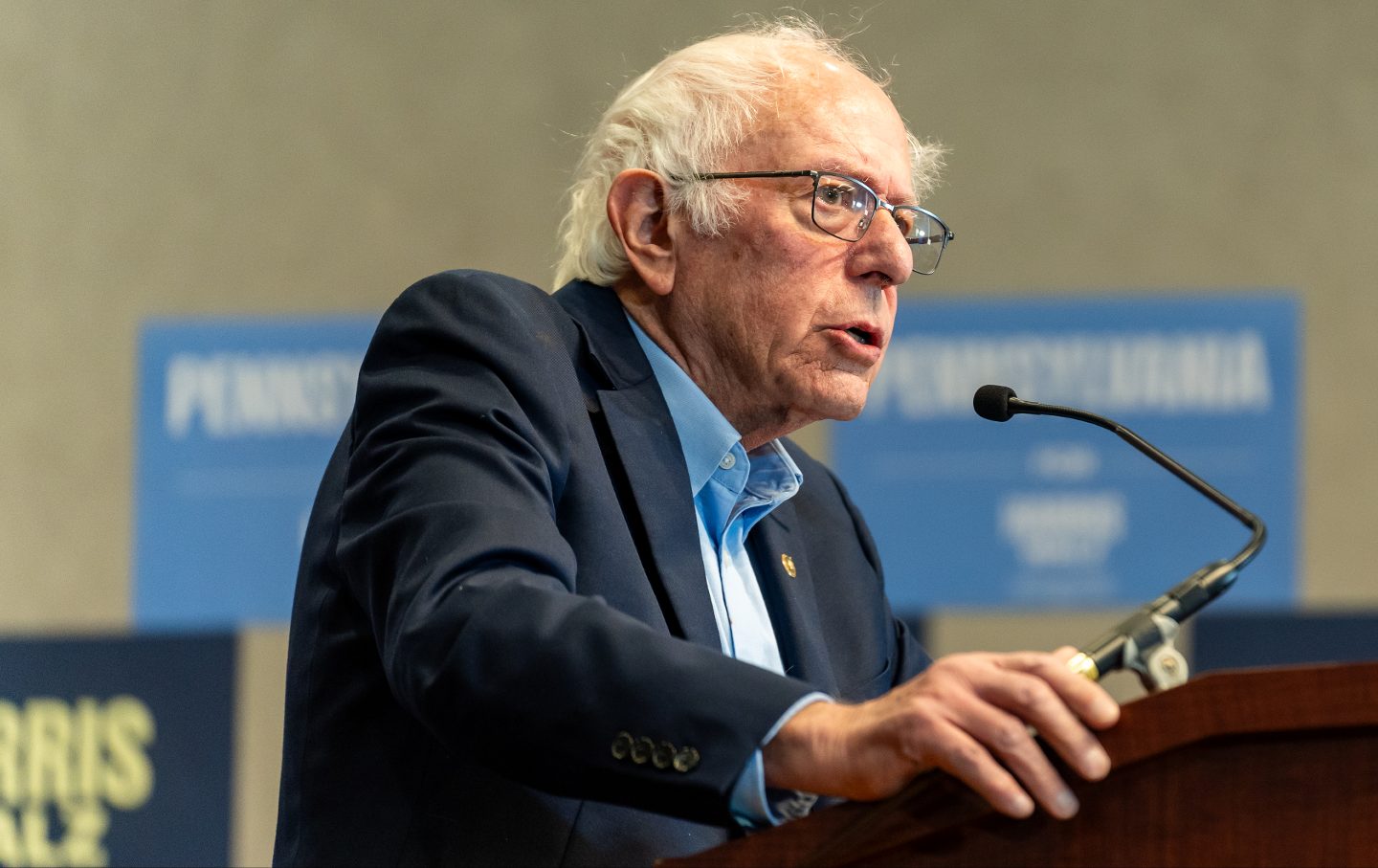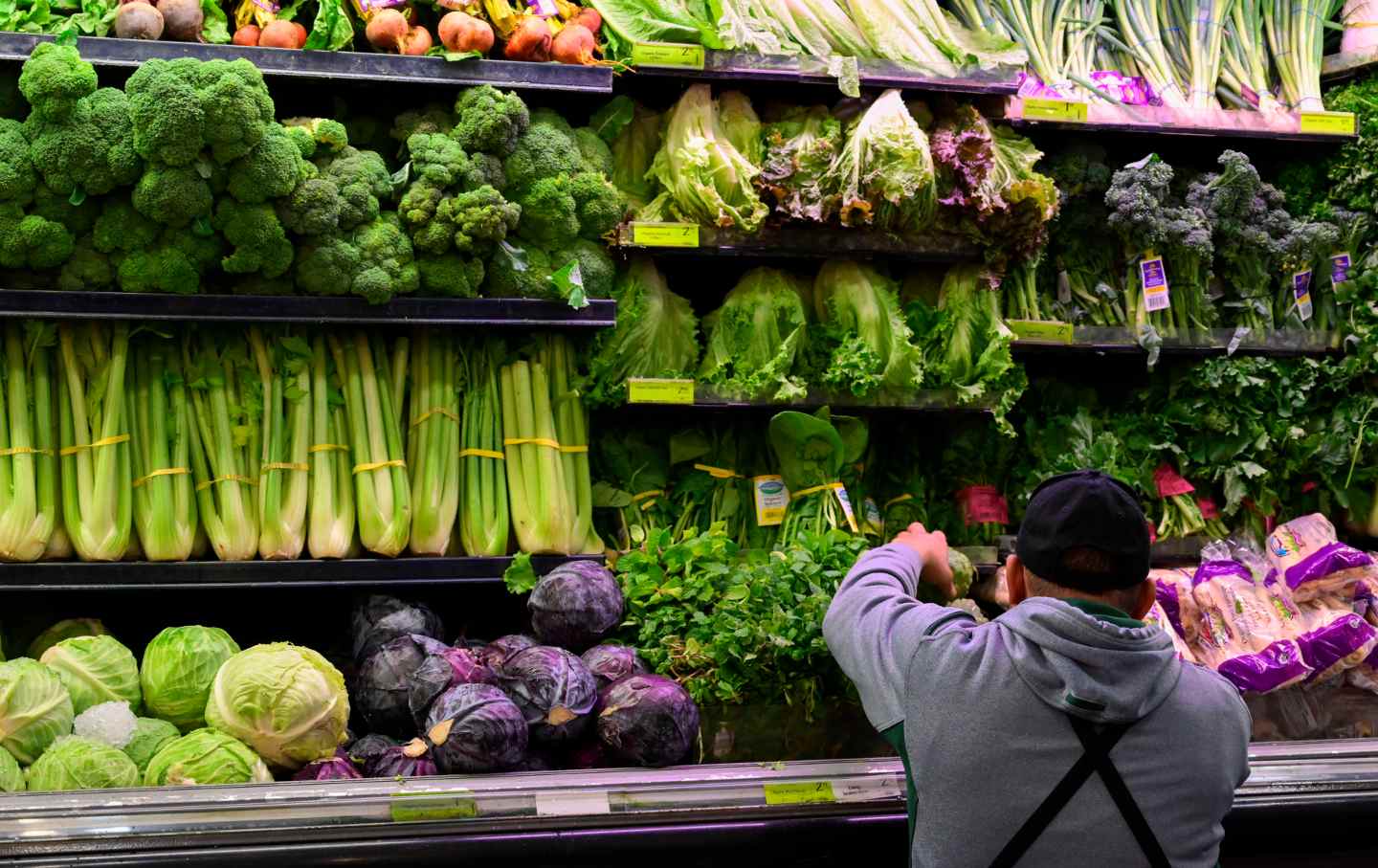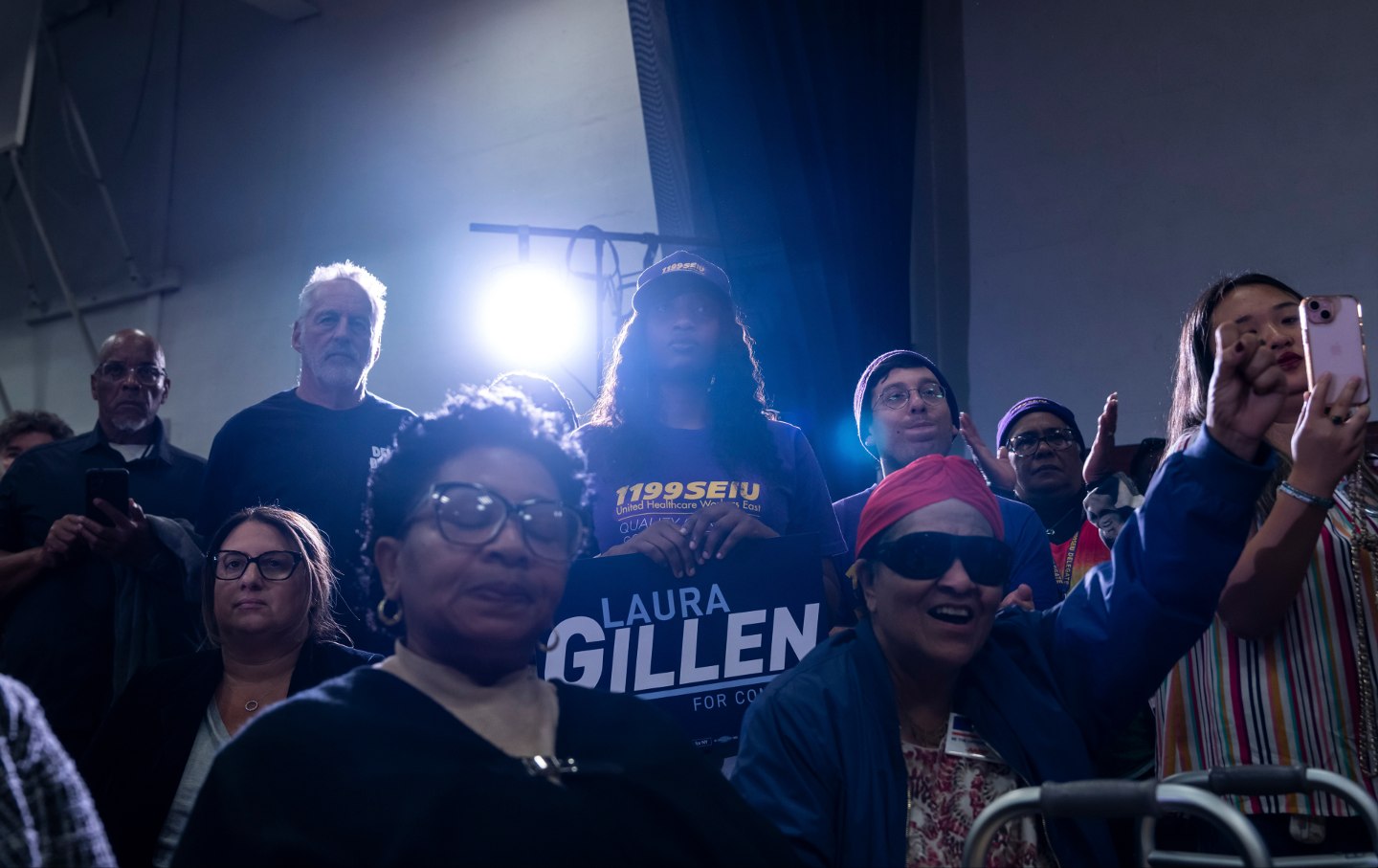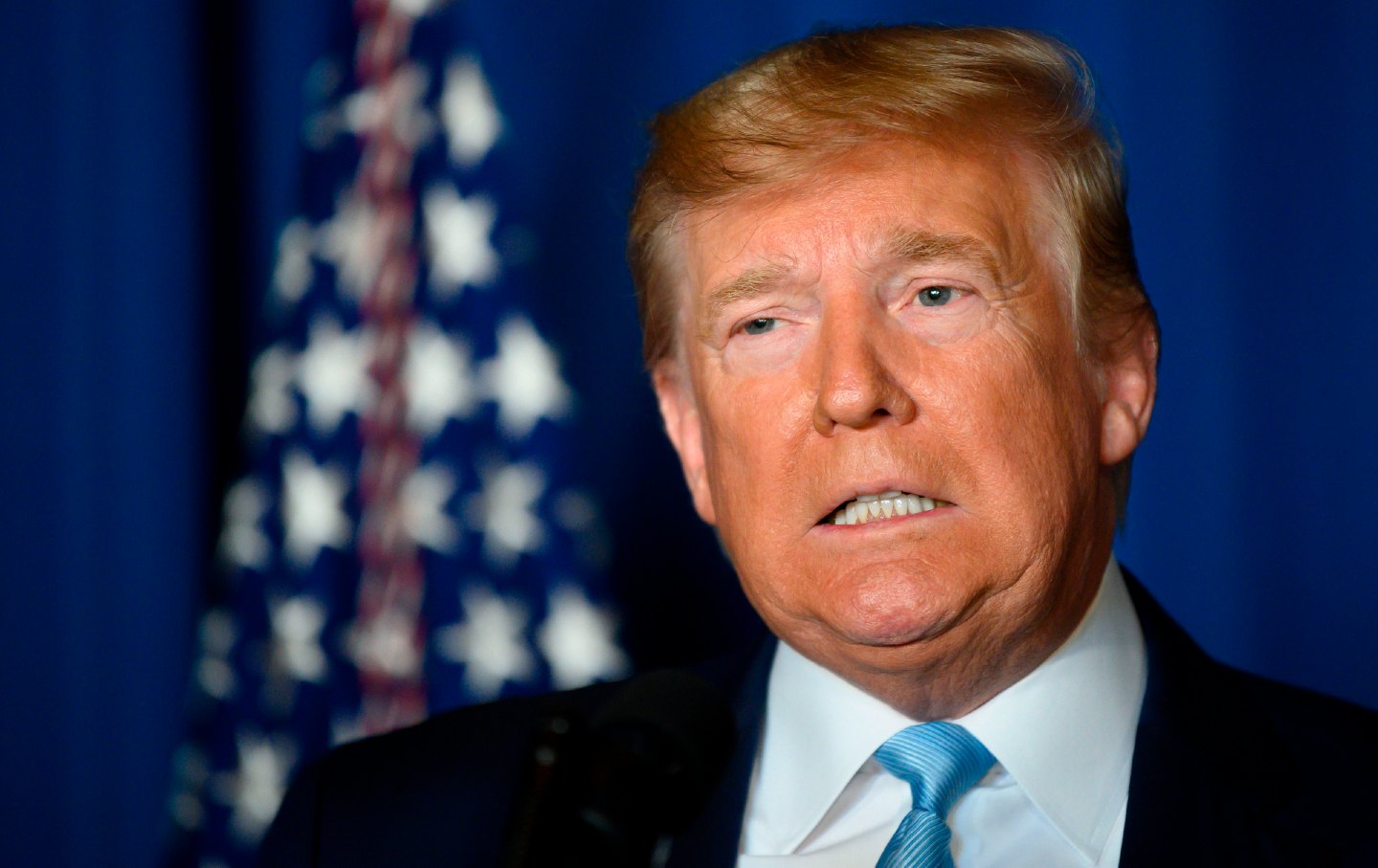Omaha, Nebraska—The five-lane Dodge Street pseudo-expressway splits this city in two. Down the middle, it has a reversible lane—known locally as the “suicide lane”—which changes directions depending on the time of day to accommodate traffic. Perhaps Nebraska’s Second Congressional District could best be imagined as the center lane on Dodge street: mutable and a little dangerous.
In the best-case scenario for Democrats, Omaha with its single electoral vote could help deliver victories in the Senate and House, and prevent a possible tie in the Electoral College come Election Day—which is why earlier this year Republicans tried, and failed, to take away the state’s unique split electoral vote system.
But if Democrats lose the Second Congressional District of Nebraska, they could find themselves tied 269–269 with Donald Trump—in which case the majority-Republican House of Representatives would get to decide who becomes president.
That’s why some 600,000 modest Midwesterners have found their “blue dot” in the spotlight—and in the crosshairs.
Omaha’s Second Congressional District has seemingly switched direction nearly every four years over the past several election cycles. Joe Biden beat Trump here by six points in 2020, but four years earlier Trump defeated Clinton by two points. And when Barack Obama specifically targeted CD-2 in 2008, he won the first Nebraskan electoral vote for a Democrat since Lyndon B. Johnson in 1964. And then he lost the district in 2012.
In recent years, more conservative-leaning exurbs in Sarpy and Saunders counties have been added to CD-2, making the district even more competitive. In 2021, Republican Representative Don Bacon complained to Politico that the redistricting didn’t give him an sure enough edge over Democrats. “There is a ‘Nebraska nice’ slogan,” said Bacon, pointing to gerrymanders in Democratic states. According to 538.com, the new lines gave Republicans a three-point boost—around the same margin that carried Bacon past his Democratic opponent, Tony Vargas, in their 2022 match-up.
A careful person wouldn’t drive in the center lane of Dodge, which is often blind to incoming traffic thanks to the city’s hilly geography. A careful politician, similarly, wouldn’t take Omaha’s blue dot for granted.
“We have a Republican mayor and “a very conservative culture,” in Omaha, said State Senator Megan Hunt, a progressive who represents midtown Omaha. But the fact that the district she represents may have the ability to determine the national election, she says, is still very exciting.
Hunt was a registered Democrat until just a year and a half ago, when she decided to ditch the party altogether. “I switched because the Democratic Party wasn’t investing in candidates in Nebraska,” she said, explaining that because of the state’s nonpartisan unicameral legislature—a legacy of Nebraska’s Populist heritage—the national Democratic Party regarded her district and others in the state as “flyover country.” (Hunt clarified in an e-mail to The Nation that nothing about her decision had to do with any actions by the state party.)
Hunt, who has fought against anti-trans and anti-abortion bills, says she was also frustrated over the national Democratic Party and PACS fundraising off her colleagues’ work only after the state had instituted an abortion ban and bans against transgender youth medical care in 2023. “We’ve held that line for years and years with no help from the Democratic Party,” said Hunt, again referring to outside national attention being paid to Nebraska, not the state Democratic Party, which had endorsed Hunt in 2022, prior to her departure.
Nebraska State Democratic Party chair Jane Kleeb says she shares a similar frustration. “We have been here, are here and will be here doing the work at the state level,” wrote Kleeb in an e-mail to The Nation. “We all wish national folks would trust and believe in our work.”
Perhaps national Democrats are hoping that vice presidential candidate Tim Walz’s home-state clout and love of Runza sandwiches will help win over local voters. Walz was the only member of either ticket to visit Omaha during this election cycle. As they say, “Nebraska, it’s not for everyone.”
Hunt and others who spoke to The Nation emphasized the independent culture of Nebraska politics, where legislative leadership is not based on party. And in the primary, unlike other states’, no D or R appears next to a candidate’s name on the ballot for statewide office. The Democratic, Libertarian, and Legal Marijuana NOW parties tend to open their primaries to all registered voters, even in federal races.
“Most Americans do not like the division that they see in Congress or in their state legislatures,” said Hunt. “And in Nebraska, we’re very proud that we don’t work that way.” She also sees Nebraska’s split electoral vote system as a model for the nation—especially given the country’s refusal to let the popular vote determine the presidency. Sam Petto, communications director for the ACLU of Nebraska agrees. “It’s probably the best system that we have,” given the “flawed system of the Electoral College.”
A similar independent spirit has animated Dan Osborn’s campaign for Senate—and could push him over the finish line to defeat incumbent Republican Deb Fischer on Tuesday. Osborn has run an interesting bipartisan, or rather anti-partisan campaign. He is sometimes painted as a progressive Bernie Sanders–esque figure or a John Fetterman 2.0 by the media—and lauded for his background of leading Kellogg plant workers on strike in 2021. At same time, he has also attempted to run to the right of his opponent on some issues. “Social Security for illegals, who would be for that? I’m where President Trump is on corruption, China, the border,” said Osborn in an ad out this week. “If Trump needs help building the wall, well, I’m pretty handy.”
Trump, however, hasn’t returned the favor, endorsing Fischer and slamming Osborn as a “Bernie Sanders Democrat” and a “Radical Left” candidate. Similarly, Fischer’s ads called Osborn a “Democrat in disguise” and “a Bernie bro, not an average Joe.” Osborn has been registered as nonpartisan since at least 2004, but he told Semafor he really “became an independent” after watching the Trump and Hillary Clinton debates. “I just kind of became disenfranchised with the two parties, and it all seemed a little fake to me.” He is not alone. Statewide, nonpartisan voters account for 21 percent of the electorate in Nebraska—a number that’s more than tripled since 1980.
For the most part, Osborn has been ignored or dismissed by national Democratic leaders. According to recent reporting by Politico, Democratic leader Chuck Schumer has not spoken to Osborn, and the leader of the Senate Democrats’ campaign arm Senator Gary Peters of Michigan told reporters in September, “[Osborn’s] not a Democrat, and I’m not engaged in that in any shape or form.” But perhaps, Politico reports, Osborn may not be picking up the phone, literally.
Nebraska’s Democratic Party chair noted that Osborn “does not want our help (which, of course, was different from what he told us all in the beginning,” wrote Kleeb, adding, “Not once has Sen. Hunt—or ANY of the 12 Independents we endorsed and are supporting this cycle—ever said they support Trump.”
Popular
“swipe left below to view more authors”Swipe →
Come Tuesday, pundits will see if campaigning as radically independent will pay off for the union leader. If he does win, Democrats will have Osborn to thank for helping take one more Senate seat away from the Republicans.
Meanwhile, Tony Vargas is running a much more standard campaign against Republican incumbent Don Bacon in Nebraska’s Second Congressional District. Two years ago, Trump encouraged Republicans to primary Bacon after the congressman refused to deny that Biden had won the presidential election. Since then, Bacon has struggled with his relationship with Trump, with Republicans calling him “a commie Democrat RINO,” and Democrats aligning him with the former president’s radical agenda.
Vargas, a first-generation college student and the son of Peruvian immigrants, is leading in the polls against Bacon—perhaps buoyed by Harris’s spending in the state: Nebraska has the eighth-highest level of presidential election spending of all states, and 95 percent of that spending is by Democrats.
Nearly all of that cash is going to win over Vargas’s district, which makes sense. Outside of Omaha, Republicans are nearly guaranteed the remaining congressional seats and electoral votes. In Nebraska’s more conservative First Congressional District, which encircles Omaha’s suburbs, Republican Mike Flood is expected to win handily, despite his absurd Tim & Eric style campaign ad that features the politician shooting down a Chinese spy balloon. The same goes for the Third Congressional District, one of the most conservative and largest in the nation, spanning 93 counties and two time zones. Similarly, in Nebraska’s second Senate seat, Democrat Preston Love Jr.—a veteran civil rights activist who is campaigning on reproductive rights and voting rights, as well as a ceasefire in Gaza—is expected to lose to former Nebraska governor Pete Rickets.
When Nebraskans fill out their choices for federal office, they will also be faced with more citizen-led ballot initiatives than ever before. Voters will decide on medical marijuana, paid sick leave, and, most notably, dueling abortion ballot measures—making it the first and only state to have two competing initiatives.
“I think people are excited to get out to vote and to end the abortion ban and remove government interference,” said Allie Berry of Protect Our Rights, the group behind Initiative 439, which would end Nebraska’s current abortion ban. That is, if voters can understand the differences between Initiative 439 and Initiative 434.
“We are doing everything we can to make sure voters are educated and know the facts about both initiatives, but there is a lot of misinformation from the opposition,” says Berry. While the Protect Our Rights measure would amend the state Constitution to guarantee the right to abortion until fetal viability, or when needed “to protect the life or health of the pregnant patient,” 434 features language about exceptions for cases of sexual assault, incest, or medical emergencies. But the latter measure would also codify Nebraska’s 2023 abortion ban into the Constitution, banning abortion after the first trimester, which Berry and others see as just the first step in stripping away bodily autonomy.
“There’s one side that is actively trying to trick and confuse. It’s really upsetting,” said Sofia Jawed-Wessel, professor of Public Health in University of Nebraska–Omaha “I don’t like people to be taken advantage of, and I don’t want people to have more confusion about the voting process.”
Senator Hunt agrees. “They can’t just come out and say what they truly believe,” she says. “In reality, what they want is a full ban.”
The top two donors to support Initiative 434 are Republican Senator Ricketts and his mother, Marlene, each giving $1 million to the efforts. Following the overturning of Roe v. Wade, Ricketts vowed to enact a full abortion ban, with no exceptions, in the state.
Despite the fact that one measure would undo Nebraska’s abortion ban and one would further curtail rights, a recent Midwest Newsroom/Emerson College poll found that the majority of Nebraska voters supported both measures. If both initiatives get more than 50 percent of the vote, the measure that received the highest number of votes wins.
Meanwhile, just two days before the date to register to vote online, former felons in the state were finally given clarity by the Nebraska Supreme Court about their voting rights—with the high court ruling that those who have completed their time should not be barred from the ballot box.
This came after Nebraska’s Republican Secretary of State Bob Evnen had blocked eligible voters from registering to vote for months. Evnen held up the process even after a bipartisan vote from the Nebraska legislature this summer said that felons should be able to register to vote without a waiting period.
This delay and confusion impacted not only thousands of newly released voters but also tens of thousands whose rights appeared to be in limbo as the court took up the case. Confusion over the law was enough for some former felons to decide they wanted “no part of it,” said Jason Witmer, a policy fellow for the Nebraska ACLU.
“I’m that concerned about going back to prison,” Tommy Moore, a legal voter for a decade, toldBolts in August. “I never want to encounter that humiliation again, and I prefer not to vote than to take the risk.”
With the high court’s ruling coming just days before registration deadlines, advocates rushed to help eligible voters register. As of last week, nearly 200 people had registered to vote in Omaha’s Douglas County, with 400 applications from the Nebraska secretary of state’s office also pending.
“A few hundred people out of thousands is still a few hundred people who realize ‘I now have a right’ and who exercised their voice,” said Witmer, who was also happy to push back on the national attention Nebraska’s politics are receiving. “We want attention for having a good football team, which we’re still struggling to do…that’s what we want attention for. We don’t want it for our prison systems.”
Those hundred votes could make all the difference for Democrats next week.
And many in the state are feeling hopeful about Omaha’s single electoral vote. Jawed-Wessel says she’s seeing neighbors who’d usually stay quiet about their political beliefs put out signs on their front lawns: a simple, yet effective, blue dot.
Can we count on you?
In the coming election, the fate of our democracy and fundamental civil rights are on the ballot. The conservative architects of Project 2025 are scheming to institutionalize Donald Trump’s authoritarian vision across all levels of government if he should win.
We’ve already seen events that fill us with both dread and cautious optimism—throughout it all, The Nation has been a bulwark against misinformation and an advocate for bold, principled perspectives. Our dedicated writers have sat down with Kamala Harris and Bernie Sanders for interviews, unpacked the shallow right-wing populist appeals of J.D. Vance, and debated the pathway for a Democratic victory in November.
Stories like these and the one you just read are vital at this critical juncture in our country’s history. Now more than ever, we need clear-eyed and deeply reported independent journalism to make sense of the headlines and sort fact from fiction. Donate today and join our 160-year legacy of speaking truth to power and uplifting the voices of grassroots advocates.
Throughout 2024 and what is likely the defining election of our lifetimes, we need your support to continue publishing the insightful journalism you rely on.
Thank you,
The Editors of The Nation
More from The Nation

I can’t support the Democratic Party position on Gaza, yet I recognize that Trump would be even worse. That’s why I’m voting for Harris on the Working Families P…
Cynthia Nixon

The senator disagrees with Kamala Harris on Gaza, as do millions of voters. But he’s been arguing that “Trump and his right-wing friends are worse.”
John Nichols

During his presidency, Donald Trump worked to deregulate our food safety laws—a deadly idea—and he has promised to roll back more protections if he is elected again.
Tom Colicchio

Laura Gillen should have won a congressional seat in 2022—but the New York Democratic Party was in shambles. This time, her creepy ex-cop opponent is going down.
Joan Walsh

It’s a grave mistake for Democrats to let Trump be the only voice expressing revulsion at militarism.
Jeet Heer

A group of performers and activists are giving voters a clear message: Under a Trump administration, not even your porn is safe.
Kim Kelly

Felecia Phillips Ollie DD (h.c.) is the inspiring leader and founder of The Equality Network LLC (TEN). With a background in coaching, travel, and a career in news, Felecia brings a unique perspective to promoting diversity and inclusion. Holding a Bachelor’s Degree in English/Communications, she is passionate about creating a more inclusive future. From graduating from Mississippi Valley State University to leading initiatives like the Washington State Department of Ecology’s Equal Employment Opportunity Program, Felecia is dedicated to making a positive impact. Join her journey on our blog as she shares insights and leads the charge for equity through The Equality Network.




